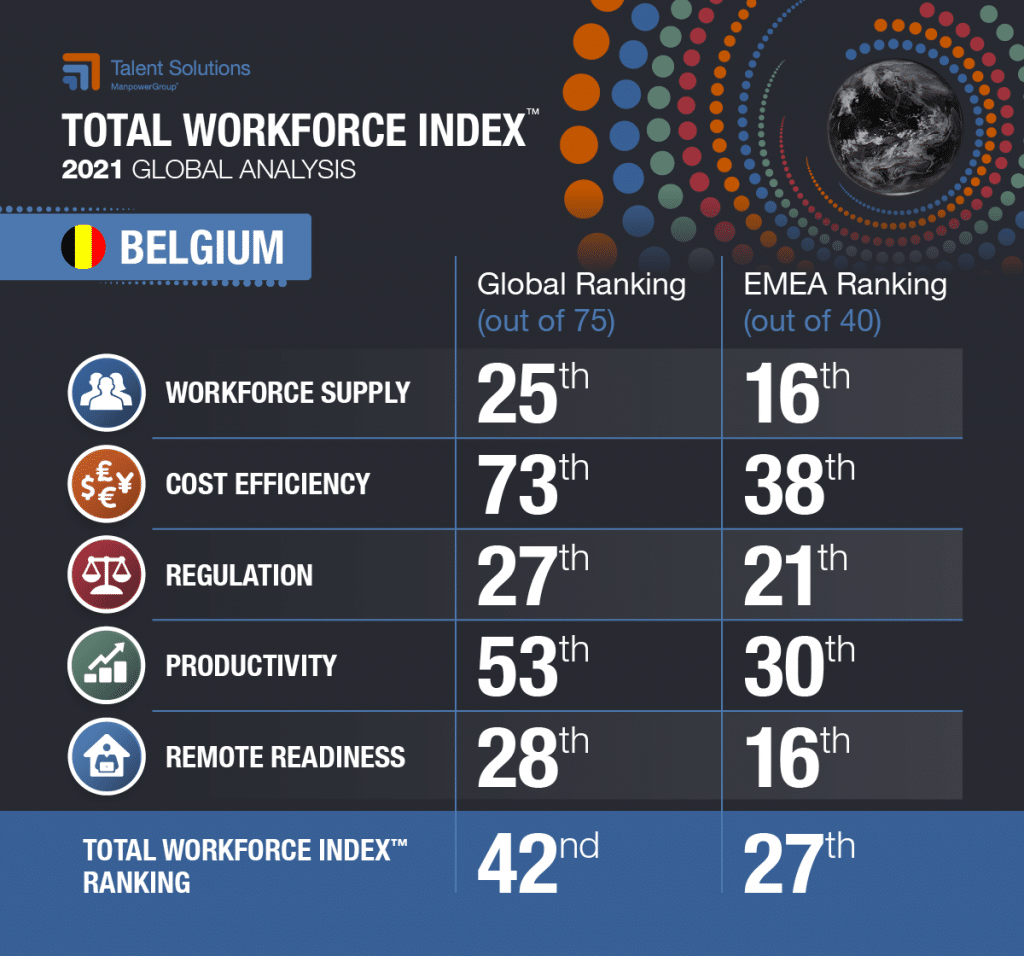Belgium 42nd (out of 75) on the ManpowerGroup Total Workforce Index™

ManpowerGroup Appoints Sebastien Delfosse to Lead BeLux
16 December 2021
ManpowerGroup named ‘Best Staffing, Sourcing & Contingent Workforce Management Company’ at the Belgian HR Excellence Awards 2021
17 March 2022Belgium drops 8 places compared to the 2020 ranking, but is still among the 20 most mature labour markets in the world
ManpowerGroup has published the eighth edition of its Total Workforce Index ™study. This Index measures and compares the relative ease of sourcing, hiring and retaining contingent and permanent workers in 75 labor markets around the world. ManpowerGroup experts analyzed 200 key factors related to 4 categories in each country: Workforce Supply, Cost Efficiency, Regulation, and Workforce Productivity. For 2021, Belgium is ranked 42nd (out of 75) globally and 27th (out of 40) in the EMEA region, down 8 places globally and 7 places regionally compared to the previous edition. However, our country is among the most mature labour markets identified by ManpowerGroup.
As the post-pandemic world is emerging, organizations are aggressively pursuing growth opportunities during the tightest labour market in decades. Indeed, with talent shortages(1) at all-time highs – 83% in Belgium and 69% globally – it has never been more difficult to attract, engage and retain talent that can drive growth. Access to skilled workers, and especially talents with the digital skills needed to transform businesses, is a key consideration in investment decisions made at the national and international level, in the short, medium, and long term. More than ever, talent issues are at the heart of corporate strategy and business decisions. In this context, ManpowerGroup’s Global Workforce Index – Total Workforce Index™ (TWI) (2) – provides insights and an objective measure of workforce performance in a specific market.
The United States in first place worldwide, the Netherlands top in Europe
Globally, the United States, Singapore, Canada, Hong Kong, and the Netherlands are at the top of the 2021 ManpowerGroup Total Workforce Index, while in the EMEA region (Europe, Middle East, Africa), the ranking places the Netherlands, Switzerland, Norway, Bahrain, and Israel in the top positions. Belgium is ranked 42nd (out of 75) globally and 27th (out of 40) in the EMEA region, down 8 places globally and 7 places regionally compared to the previous edition.
Compared to other European countries, Belgium’s 42nd place in the world is well behind the United Kingdom (6th), Switzerland (7th), Ireland (8th), Estonia (10th), Norway (11th), Sweden (13th), Denmark (14th), Portugal (17th), the Grand Duchy of Luxembourg (19th), Germany (26th), Spain (29th), Poland (33rd) or Austria (35th). Our country trails France (38th) and Croatia (41st), but is ahead of Romania (46th), Italy (49th) and Greece (57th). Other countries to highlight: Japan (16th), China (44th), Morocco (48th), Russia (58th) and Vietnam (59th). Lastly, Bolivia (73rd), Nicaragua (74th), and Honduras (75th) take the bottom places in the ManpowerGroup ranking.
Global Ranking : Total Workforce Index 2021
Belgium among the 20 most mature labour markets
ManpowerGroup’s analysis places Belgium in the top 20 most mature labour markets, alongside the United States, the United Kingdom, Germany, France, and the Netherlands. These markets have the largest number of ‘growth talents’ with digital skills (with at least 40% of the workforce highly qualified, 46.7% in Belgium) and a strong training infrastructure (upskilling and reskilling). For ManpowerGroup, these two criteria are key in assessing labour market maturity. ManpowerGroup has also identified 16 ‘Incubator’ countries with high potential for digital, manufacturing, and renewable energy technologies (including Austria, Portugal and Spain, with Germany and the UK also included in this group). ManpowerGroup grouped 31 countries in the ‘Emerging’ category where Millennials and Generation Z represent 50% of the available workforce (Brazil, Philippines, India, and Indonesia).
Belgium’s strengths and weaknesses
“Belgium has dropped in our workforce ranking, both globally and in Europe. This is a bad sign for the appeal of our country, both for incoming foreign investment and job creation decisions,” explains Sébastien Delfosse, Managing Director of ManpowerGroup BeLux. “However, according to our analysis, our country is one of the 20 most mature labour markets in the world. Our workforce is still recognized for its high level of qualification and can rely on a training infrastructure that can ensure the digital transition. Several factors continue to weigh negatively on our labour market performance; notably, labour costs, where Belgium ranks 73rd out of 75 worldwide. Furthermore, efforts must continue to be made at the regulatory level to improve productivity and flexibility, but also to improve the employment rate and the ease of entrepreneurship, to unleash the potential for innovation in the country’s three regions.”
In summary, with its 42nd (out of 75) place at global level and 27th place (out of 40) at EMEA level, Belgium achieves the following scores for the 4 criteria: 25th place (16th at EMEA level) for Workforce Supply, 73rd place (16th at EMEA level) for Labour Costs, 27th place (21st at EMEA level) for Regulatory Framework, and 53rd place (30th at EMEA level) for Workforce Productivity. Finally, our country ranks 28th on the Remote Readiness ranking (16th at EMEA level). This criterion evaluates the different dimensions of telework, such as the number of people able to work remotely, access to technology and the performance of communication tools, the control of risks linked to cybersecurity, the performance of the administration’s online services, regulatory aspects, and the human dimension (access to childcare services).
In its report, ManpowerGroup identified three key challenges in global labour markets: the importance of infrastructure and training strategies in order to attract and retain talent and build a high-performing workforce nationwide; the risk of wage inflation in mature markets due to talent shortages; and the implementation of flexible working models for all categories of workers, including the most highly skilled.
A strategic tool
The Total Workforce Index helps ManpowerGroup Talent Solutions experts to assist companies with their long-term workforce planning strategies, including talent strategy, location strategy, remote work allocation, capacity planning, cost savings, market investments, organizational restructure, workforce mix, and sourcing strategy.
(1) ManpowerGroup Talent Shortage Survey (2021) : more info
(2) Total Workforce Index™: ManpowerGroup Total Workforce Index™ (TWI) is an indicator of workforce potential in a specific market. It is based on a rigorous methodology and on a unique calculation formula that allows the analysis of more than 200 criteria related to 4 categories: Workforce Supply, Cost Efficiency, Regulation, and Workforce Productivity. It concerns information published by international organizations such as the World Bank, the OECD, and the World Economic Forum, and data collected by ManpowerGroup globally. In concrete terms, the Total Workforce Index measures the attractiveness of the labour markets of 76 countries around the world, by analyzing the relative ease of sourcing, hiring, developing, and retaining the talents they need to ensure their growth. The country with the highest score on this index is the one with the most attractive labour market. https://talentsolutions.manpowergroup.com/twi









